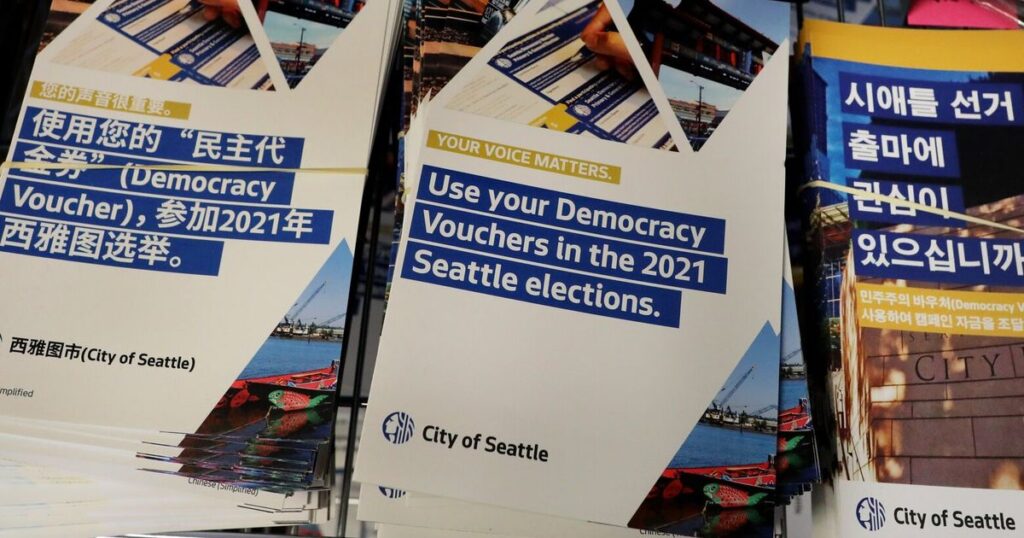Seattle voters have had the chance to make use of tax {dollars} to help candidates for metropolis positions in 4 election cycles now, and this yr is the fifth. And property house owners have paid about $30 million over the past 10 years for the privilege.
The privilege, that’s, of principally not utilizing them. Within the 2023 election, as an illustration, solely 30,649 voters donated any of their 4 $25 vouchers to candidates. That quantities to solely 4.72% of Seattle voters. Meaning about 95% of metropolis voters misplaced monitor of them of their mail pile, recycled them or tossed them in with their unspent present playing cards.
The mayor and Metropolis Council, whose members’ campaigns harvest the payout, are asking voters to pony up for the voucher system once more on the Aug. 5 poll — this time for $45 million over the subsequent 10 years.
Whereas proponents of Seattle’s democracy vouchers program laud the “first within the nation” public finance scheme as profitable, it has barely moved the needle by way of voter participation, regardless of their claims primarily based on an outdated research.
Take the Sure on Prop. 1 marketing campaign’s web site, which argues to resume this system for one more 10 years. Rife with hyperbole and no precise stats, the web site has this assertion: “A study from UC Santa Barbara discovered that the Democracy Voucher Program boosted voter turnout by practically 5 proportion factors — a major affect in historically low-turnout native elections.”
However right here’s the trick. That research checked out voter turnout between 2009 and 2021, the primary yr the higher-profile citywide races for mayor and metropolis lawyer had been eligible for vouchers. Metropolis Council races had been eligible in 2017 and 2019.
In 2021, 48,000 individuals — or 7.6% of the voting-age inhabitants — donated vouchers to candidates. That was up from 6.7% in 2019. However by the final cycle, the 2023 Metropolis Council district elections, that quantity had plunged to 4.72% — even lower than the comparable 2019 cycle.
So in citing that research, which isn’t linked from the web site, proponents are directing voters to avert their eyes from the latest statistic that refutes the conclusion.
Proponents additionally say Seattle’s voucher system is main the nation. True. However after 10 years, solely Oakland has adopted. Form of. Voters there authorized Measure W again in 2022, however metropolis leaders thus far haven’t been capable of fund this system. Their native Public Ethics Fee is getting ready for program launch in time for the 2028 election.
The democracy vouchers program was supposed to cut back outdoors cash in metropolis campaigns, but it surely has not restricted impartial expenditures, so big-money pursuits nonetheless get to play. Actually, a Philadelphia political motion committee, The Piper Fund, has contributed $200,000 to renewing and increasing the vouchers program in Seattle.
In saying his help for democracy vouchers’ enlargement, Seattle Mayor Bruce Harrell promised to convene a piece group to take a look at its weaknesses. Town has had 10 years to tweak this program.
Some reforms have been made. Initially, the vouchers had been despatched out by Jan. 1 to voters, absolutely 5 months earlier than the candidate submitting deadline, clearly giving incumbents and candidates stood up by particular pursuits a bonus. That mailing date was moved to March 1, however that’s nonetheless too early.
Seattle’s voucher program is funded by property taxes, so the cash retains rolling in. Voters have an opportunity to determine whether or not to proceed to fund this experiment, which has barely made a distinction in Seattle politics. Vote “no” on Seattle’s Proposition 1.

